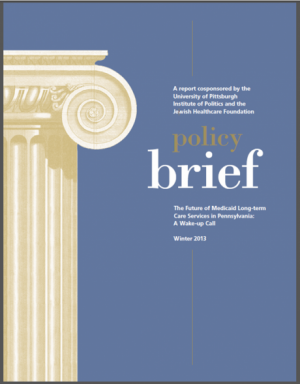Policy Brief - Future of Medicaid Long-term Care Services in PA (2013)
Cosponsored by the Institute of Politics at the University of Pittsburgh and the Jewish Healthcare Foundation, this policy brief examines the long-term care system in the commonwealth. Pennsylvania has the fourth largest percentage of residents age 65 and older, and the number of Pennsylvanians aged 85 and older grew 28.7% from 2000 - 2010, according to the 2010 U.S. Census.
Demand for long-term care services is growing rapidly. Nearly 70% of individuals turning 65 in 2012 are expected to need long-term care services at some point in their lives - for an average of three years. The report notes that this increase along will cause Medicaid long-term care costs to increase by 24% in the next 13 years.
In the commonwealth as of 2010, 82% of the paid long-term care was delivered in nursing homes. Two thirds of nursing home residents were covered by Medicaid. Nursing home care is extremely expensive and most people who enter nursing homes do not have long-term care insurance and within a year spend down their assets and savings and become dependent on Medicaid.
Pennsylvania's aging population is increasingly relying on Medicaid, and Medicaid is consuming a greater share of the commonwealth's general budget. With health care costs expected to continue to rise, this situation is unsustainable for Pennsylvania.
The report offers a set of recommendations to redesign Pennsylvania's long-term care system to:
- Prepare for the demographic explosion of older Pennsylvanians needing long-term care,
- Improve and better coordinate that care, and
- Serve people where they prefer to be served (where possible), including in their own homes, which typically costs significantly less than nursing facility care.
The full report and related PowerPoint can be downloaded below.
